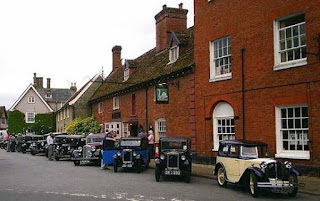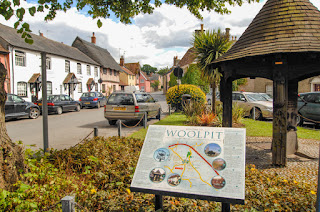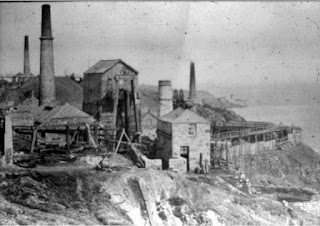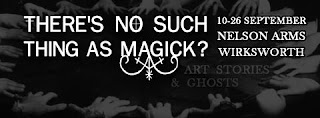Salutations all!
Those that may have met me and whether my ramblings will probable have heard of my tales putting on art exhibitions with a supernatural twist. This year is no different. After a few dramatic difficulties, myself and my compatriot - Ian Wadsworth - have finally nailed down a times, dates and places.
There'll be more details to come on this blog, as well as on www.derbyshirehauntedhouseproject.blogspot.com www.facebook.com/HauntedHouseProject and www.facebook.com/pages/Theres-No-Such-Thing-As-Magick/501086330026370
What's new!!
From the 10th to the 26th of September, there'll be a FREE art exhibition throughout the day.
On the 11th and the 26th of September, from 8 to 9pm, there'll be an Authentic Séances.
There is a £5 entrance fee payable at the door. Once in the séance you must not leave the circle during the séance. Only attend if you have a genuine interest.
On the 12th and the 19th of September, from 8 to 9 pm, there will be short story readings from Edgar Allan Poe and Thadeus Morticaine.
This is the official blog for Thadeus Morticaine. He is an aspiring author of several genres, currently working on a action packed series of stories set during the English Civil War. There is also a gothic horror series based on someone that might just so happen to be his great-great-great-grandfather. Also in the pipeline are a fantasy series where magicians plumb the depths of the light spectrum to cast their spells, a World War Two period re-telling of folk tales and fairy stories, as well as a fast paced sci-fi series harking back to the old space operas. Oh, and don't forget a detective series where a maniacal villain awaits behind every corner.
With an indepth interest in history, old pulps and black and white movies, this blog will have regular posts about historical events that he finds inspiring and which he hopes will be of a great use to others with their stories, or to those with even the slightest of interests. There'll also be articles on authors and stories that he finds particularly interesting and inspirational. He hopes that you'll find them useful as well.
You can also follow him on facebook at Thadeus Morticaine
With an indepth interest in history, old pulps and black and white movies, this blog will have regular posts about historical events that he finds inspiring and which he hopes will be of a great use to others with their stories, or to those with even the slightest of interests. There'll also be articles on authors and stories that he finds particularly interesting and inspirational. He hopes that you'll find them useful as well.
You can also follow him on facebook at Thadeus Morticaine
His twitter account is @morticaine
He can also email him with this canny link Thadeus Morticaine
Friday, 10 July 2015
Labels:
art,
art exhibition,
Derby,
Derbyshire,
Middleton by Wirksworth,
Nelson Arms,
occult,
paranormal,
reading,
séance,
short story,
story,
supernatural,
tarot,
Thadeus Morticaine,
Wirksworth Festival,
writer,
Writing
Saturday, 4 July 2015
Of a sign which was seen in the heavens, and of the storming of certain castles
This is the History of English Affairs again. William of Newburgh finds himself utterly speechless in this episode, and this from a man that by all accounts has his head screwed on tighter than the lid of a pickle jar.
 |
| Aumale, France. Now. |
 |
| Twin Suns |
 |
| Nonancourt, France. Now. |
In the octaves of Pentecost [16 June 1196], and in the first hour of the day, two suns appeared in the heavens; namely, the true sun and a second, its equal in size and brilliancy. Nor was it easy to discern which of them was the true one, unless by its regular course; for the other appeared to follow it at a little higher elevation -- a presage, perchance, of the evils, which ensued: and this sign I beheld with my own eyes, with some others who were with me. After we had for some time stood gazing at so unusual a spectacle in suspense and amazement, of a sudden, like men overcome with fatigue we were casting down our eyes, the counterfeit of the true sun vanished away. Nor was it long after this that, the period of the truce which had slightly cheered the harassed people being completed, the bloodthirsty rage of the princes once more broke out. To arms rushed everyone at full speed; and the provinces lately so flourishing was devastated by fire and sword.
The king of France with his forces besieged Aumale, and the king of England that castle which is called Nonancourt, which was formerly in his possession, but which some time since had been seized by the French monarch. Having quickly gained possession of it, he was besought by his people to undertake the task of repelling the enemy and raising the siege; but he paid no heed to their requests, either dreading a battle, which must have been bloody to the last degree, or trusting with confidence in the valour of his men who were gallantly defending the beleaguered fortress. Turning about, with the intention of laying waste the hostile frontiers, he studiously endeavoured to draw off the besiegers without mutual bloodshed; but persisting with stubborn determination in effecting his purpose, at last, after much labour and loss to his army, he obtained possession of the castle by surrender, and razed it to the ground. This loss but little afflicted the king of England, who was compensated for it by the possession of a more renowned castle; which, however, fell not long after once more into the hands of the French king, having been surprised at a moment when it was inadequately defended. The enmity between the princes waxing fiercer and fiercer, the task of restoring peace was undertaken in vain by the well-disposed and prudent, for they closed their ears to all peaceful counsel. For, as it is written, "They are like the deaf adder that stoppeth her ear; which will not hearken to the voice of the charmers" [Psalm 8: 4, 5.]
In this matter the cause of the king of England, who was only seeking his own right, was the more powerful, and his wrath beyond a doubt the juster, as has been shown above. Peace being thus despaired of -- since neither the one could by any reasoning be induced to give up that which he held unlawfully, nor the other to rest until his right was re-established, -- the more these proud princes chafed at one another, so much the more did the unhappy people lament; for whenever kings rage, the innocent people suffer for it.
Labels:
12th century,
Aumale,
author,
double suns,
fairy tale,
folklore,
France,
History of English Affairs,
horror,
Nonancourt,
occult,
omen,
paranormal,
supernatural,
Twin suns,
two suns,
William of Newburgh,
Writing
Tuesday, 23 June 2015
Of the Green Children
Again, this is segment from the
History of English Affairs by William Newburgh. It tells of two children who
turn up in an East Anglian village with green skin and who can’t speak a word
of English. I have read an account of this occurrence in the venerable Fortean
Times and I’ve been given the idea that this has gone down into local folklore
and the facts of which have been modified into a local fairy tale.
Enjoy!
 |
| Woolpit, Suffolk |
 |
| Green Children of Woolpit, Suffolk |
 |
| Woolpit, Suffolk |
 |
| Woolpit,,Suffolk |
Nor does it seem right to
pass over an unheard-of prodigy, which, as is well known, took place in England
during the reign of King Stephen. Though it is asserted by many, yet I have
long been in doubt concerning the matter, and deemed it ridiculous to give
credit to a circumstance supported on no rational foundation, or at least one
of a very mysterious character; yet, at length I was so overwhelmed by the
weight of so many and such competent witnesses, that I have been compelled to
believe, and wonder over a matter, which I was unable to comprehend, or
unravel, by any powers of intellect.
In East Anglia there is a
village, distant, as it is said, four or five miles from the noble monastery of
the blessed king and martyr, Edmund; near this place are seen some very ancient
cavities, called "Wolfpittes," that is, in English, "Pits for
wolves," and which give their name to the adjacent village. During
harvest, while the reapers were employed in gathering in the produce of the
fields, two children, a boy and a girl, completely green in their persons, and
clad in garments of a strange colour, and unknown materials, emerged from these
excavations. While wandering through the fields in astonishment, they were
seized by the reapers, and conducted to the village, and many persons coming to
see so novel a sight, they were kept some days without food. But, when they
were nearly exhausted with hunger, and yet could relish no species of support
which was offered to them, it happened, that some beans were brought in from
the field, which they immediately seized with avidity, and examined the stalk
for the pulse, but not finding it in the hollow of the stalk, they wept
bitterly. Upon this, one of the bystanders, taking the beans from the pods,
offered them to the children, who seized them directly, and ate them with
pleasure. By this food they were supported for many months, until they learnt
the use of bread.
At length, by degrees, they
changed their original colour, through the natural effect of our food, and
became like ourselves, and also learnt our language. It seemed fitting to
certain, discreet persons that they should receive the sacrament of baptism,
which was administered accordingly. The boy, who appeared to be the younger,
surviving his baptism but a little time, died prematurely; his sister, however,
continued in good health, and differed not in the least from the women of our
own country. Afterwards, as it is reported, she was married at Lynne, and was
living a few years since, at least, so they say.
Moreover, after they had
acquired our language, on being asked who and whence they were, they are said
to have replied, "We are inhabitants of the land of St. Martin, who is
regarded with peculiar veneration in the country which gave us birth."
Being further asked where that land was, and how they came thence hither, they
answered, "We are ignorant of both those circumstances; we only remember
this, that on a certain day, when we were feeding our father's flocks in the
fields, we heard a great sound, such as we are now accustomed to hear at St.
Edmund's, when the bells are chiming; and whilst listening to the sound in
admiration, we became on a sudden, as it were, entranced, and found ourselves
among you in the fields where you were reaping." Being questioned whether
in that land they believed in Christ, or whether the sun arose, they replied
that the country was Christian, and possessed churches; but said they,
"The sun does not rise upon our countrymen; our land is little cheered by
its beams; we are contented with that twilight, which, among you, precedes the
sun-rise, or follows the sunset. Moreover, a certain luminous country is seen,
not far distant from ours, and divided from it by a very considerable
river." These, and many other matters, too numerous to particularize, they
are said to have recounted to curious inquirers. Let everyone say as he
pleases, and reason on such matters according to his abilities; I feel no
regret at having recorded an event so prodigious and miraculous.
Appendix 1: On further research, I have found that there is a form of lead
poisoning that comes about when a person lives without proper access to
daylight. This can give a person grey
skin tinged with a little green. This is the nearest thing I have found to a
none supernatural explanation to this phenomena. As for the children not being
able to understand a word of English, it could be speculated that they could
have been Welsh or Cornish. The Celtic language would still have been common in
Wales or Cornwall in the 12th century. Could that have been the case
with these two youngsters? With small parties of Vikings making their way to
the Arabian court and to America during the previous four centuries, it could
be possible. Stranger things have happened.
 |
| Welsh tin mine |
Appendix 2: In regards to the two youngsters appearing out of the ground, there
could very well be a connection with this and the possibility that they were
from mining families – see above, in relation to the possible lead
poisoning/sunlight deprivation. Mines would have employed children in this
period. Living in or near mines and caverns may well have been the only thing
that they were used to. Thus, they would have sought shelter in similar places
on their possible journey east.
Labels:
12th century,
fairy tale,
folk tale,
folklore,
Green Children,
History of English Affairs,
occult,
paranormal,
Suffolk,
supernatural,
tin mine,
Viking,
Wales,
Welsh,
William of Newburgh,
Woolpit
Subscribe to:
Comments (Atom)

